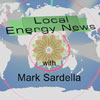Santa Fe Group Creates Citizens' Energy Board
 Tuesday, June 3, 2008 at 09:20PM
Tuesday, June 3, 2008 at 09:20PM 
A group of citizen’s in Santa Fe, New Mexico is petitioning the Board of County Commissioners to establish a Citizens’ Energy Board to guide the Commission on energy matters that come before it. The group began holding meetings in response to a plan by Houston-based Tecton Energy to begin drilling for oil and gas in the Galisteo Basin just south of Santa Fe.
The move by Tecton had already prompted formation of an activist group called “Drilling Santa Fe”, which has now formed an alliance with more than sixty other organizations to oppose drilling in the region. The Citizen’s Energy board is an outgrowth of that alliance that seeks to ensure that the concerns of citizens are well represented in the drilling debate, as well as in all energy matters effecting County residents, going forward.









A Call for an Energy Democracy
Most of us will cite renewable energies as the key, or reduced emissions of carbon dioxide, or perhaps we want greater independence from foreign oil. But these visions have recently given rise to some questionable efforts, such as the push to build giant transmission corridors to access distant wind resources. Recently we have even seen an increased willingness to take a fresh look at nuclear power.
But there’s another vision for our energy future that doesn’t lead to such bizarre results. Instead, it leads to stronger, more self-reliant communities. It reaffirms local sovereignty over energy resources, allowing communities to decide for themselves how they will meet their energy challenges.
The vision I’m speaking of is an energy democracy. In an energy democracy, the focus shifts away from technology, and towards people. Decisions about energy are made based on how they empower communities, and provide opportunities for civic participation. If this sounds too theoretical, consider all the ways that our current energy system has disempowered us. We say that we live in a democracy, yet we depend almost entirely on corporations located outside our communities to provide our energy needs. Can the people have power in such a system?
Democracy begins in our communities, so it is within them that we must re-empower ourselves by re-creating the ability to provide our energy needs. And there are practical ways to begin that process. Taking local ownership of the electric power system opens up the potential to use feed-in tariffs to favor local, independent generators of energy. District heating systems can similarly empower local thermal energy providers. And small-scale biofuel production can be done locally without putting the stress on food production that we have seen when biofuel experiments are attempted on an industrial scale.
In a democracy, by definition, the power is held by the people. Until this is literally the case, I don't see how we can claim to have one.